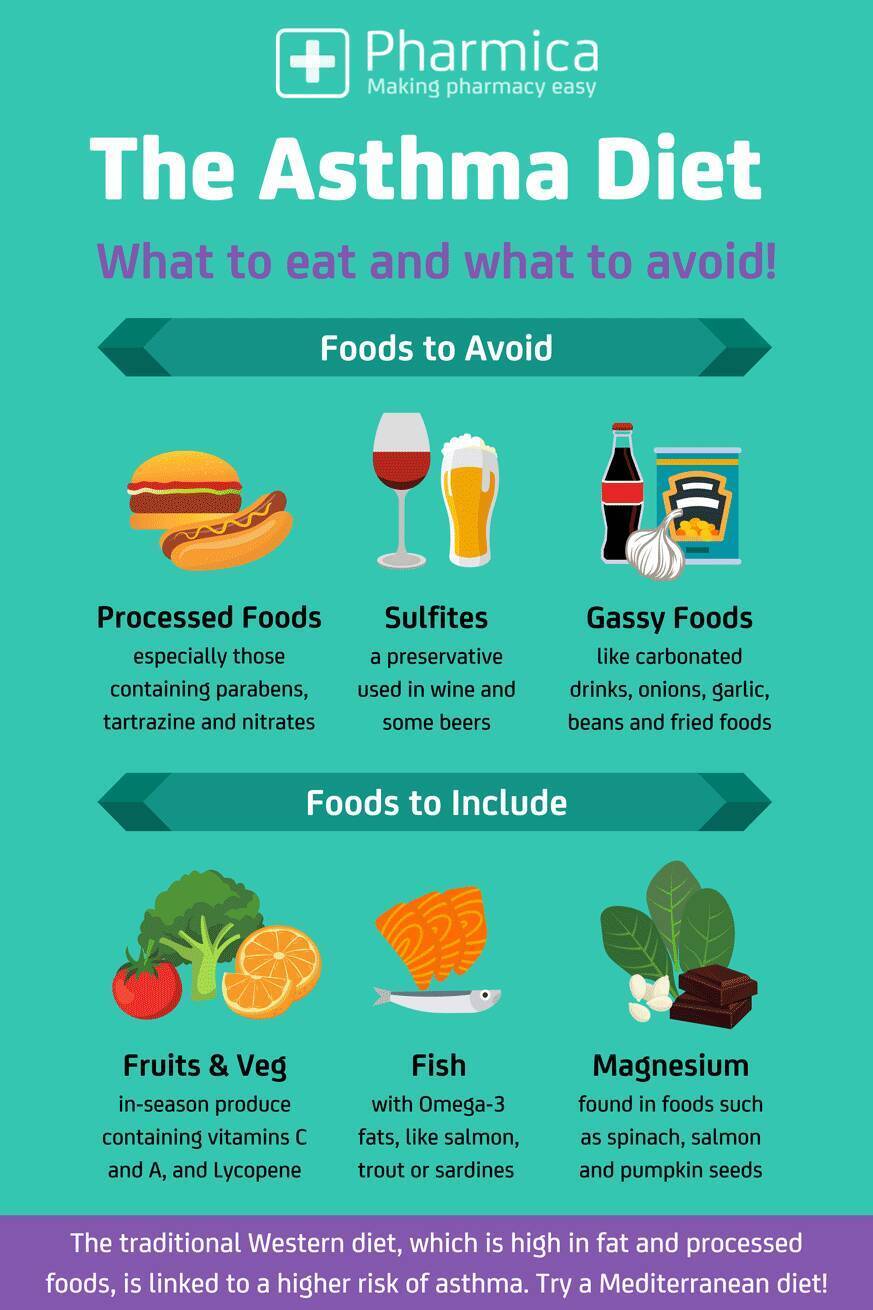
Did you know more than 5 million people have asthma in the UK[1]? With approximately 160,000 asthma diagnoses being recorded in the country every year as per the Institute for Health and Care Excellence[2], it’s more important than ever to understand how to effectively manage the condition.
One of the ways asthma can be managed (in addition to the use of asthma treatments) is through dietary changes. Knowing what foods are good for asthma and what foods might trigger the condition can go a long way toward reducing the risk of asthma.
With this in mind, our pharmacists have put together an expert guide discussing potential asthma food triggers, beneficial foods for asthma, and a possible asthma diet patients could follow to reduce the likelihood of an episode.

Asthma and diet: What’s the connection?
Asthma and diet are connected through four types of stimuli that are present in certain foods - allergens, histamines, sulfites, and salicylates. Each of these stimuli has the potential to cause asthma episodes through varying mechanisms and can impact asthma management.
Food allergens can trigger the production of antibodies called immunoglobulin E (IgE) in some people. As IgE levels increase, the body’s levels of histamine (an inflammatory chemical) tend to increase simultaneously[3]. This raises the probability of airways being constricted and can lead to the affected person experiencing asthma symptoms.
Foods that are not known to contain allergens can still trigger asthma if they contain sulphites and/or salicylates. Sulphites are substances found in certain foods and beverages such as processed meats, beer and wine that can cause the bronchial tubes in the lungs to tighten and cause an asthma episode.
On the other hand, salicylates are naturally occurring chemicals that can prompt the production of an inflammatory mediator called leukotrienes in some people. Leukotrienes bind to receptors on mucus-producing cells - an increase in their production means more mucus is produced in the bronchial tubes and an increased probability of an asthma episode.
Foods that help asthma
Magnesium-rich foods
Research shows that magnesium can act as a muscle relaxant by blocking calcium from binding to muscle proteins such as troponin C and myosin which typically cause muscles to contract[4]. The same mechanism applies to muscles in the lungs - which might be why magnesium-rich foods can help with asthma.
There is ample empirical evidence to support the claim that magnesium-rich foods help with asthma. For instance, one study found that individuals between the ages of 11 and 19 who had lower levels of magnesium also had lower lung flow and volume[5].
This implies that eating foods that are high in magnesium such as pumpkin seeds, dark chocolate, spinach, and salmon can help people with asthma to better manage the condition.
Foods containing omega-3 fatty acids
Studies have shown that long-chain omega-3 fatty acids can help inhibit the production of excessive inflammatory mediators in the body[6]. This can reduce the likelihood of an asthma episode due to a better balance of inflammatory mediators in the body that is vital to preventing the airways from constricting frequently.
Fatty fish such as salmon and mackerel as well as flaxseed, walnuts, and chia seeds all have naturally high concentrations of omega-3 fatty acids. Therefore, a diet that includes these foods can potentially benefit people with asthma provided they are not allergic to any of the above.
With that said, it is important to note that some of these foods may exacerbate asthma symptoms if the patient is allergic to them. This is why we recommend speaking to a pharmacist or GP about how your body might react to an increased intake of foods such as fatty fish before incorporating them into your diet as a potential way to manage asthma.
Probiotics
Probiotics are bacteria and yeasts that naturally occur in certain foods such as kimchi and yoghurt and help with balancing the gut microbiome. Some studies suggest that consuming probiotics can mitigate airway inflammation and prevent asthma episodes by ensuring a balanced number of Th1 and Th2 cells in the body[7],[8].
Th1 and Th2 cells produce cytokines that can trigger inflammation. Therefore, a disbalance in their levels in the body can increase the probability of airway inflammation and other asthma triggers.
Ginger
There is some evidence to suggest that the 6-shogaol and zerumbone compounds found in ginger can help with asthma management.
6-shogaol
6-shogaol is a compound that is produced when ginger is cooked. According to some studies, 6-shogaol can inhibit inflammation by reducing the function of leukocytes (a type of white blood cell that fights infections) when they come into contact with lipopolysaccharides (an inflammatory substance)[9].
These anti-inflammatory properties of 6-shogaol can help prevent asthma symptoms and bronchoconstriction. With that said, it’s worth noting that the research on 6-shogaol is currently limited to in-vitro studies and therefore may not directly apply to humans.
Zerumbone
Some studies suggest that zerumbone (a compound found in the oils within ginger) can help to modulate Th1 and Th2 cells in the same way as probiotics[10]. This can help to prevent airway inflammation and other symptoms of asthma - although more research is required to further substantiate this mechanism.
Foods that trigger asthma
Foods containing sulphites
Sulphites are preservatives added to various foods and drinks to slow down bacteria/mould growth and delay discolouration. Research shows that 13% of people with asthma also have sulphite sensitivity - a condition characterised by wheezing, chest tightness, and/or coughing following the consumption of foods and drinks containing sulphites[11].
Sulphites occur naturally in some foods such as asparagus, lettuce, tomatoes, and eggs. They are also typically added to wine, beer, pickled foods, and pre-peeled potatoes. It is important to note that this is not an exhaustive list and it is recommended to conduct research on sulphite concentrations in food and drinks before modifying your diet.
If you are unsure about the impact of consuming sulphites on your asthma, we would recommend consulting a pharmacist or GP beforehand - especially if you have experienced asthma symptoms after eating them in the past.
Inflammatory foods
Some foods are known as inflammatory foods because they can prompt the immune system to activate an inflammatory response when digested. This can subsequently lead to inflammatory cells and cytokines being released into the body which can trigger asthma symptoms by restricting the airways and making it difficult to breathe.
Peanuts
Recent research suggests that some people can experience respiratory inflammation following an allergic reaction to storage proteins found inside peanuts[12]. This is referred to as allergic asthma - a condition characterised by airway inflammation that results from breathing in allergens such as storage proteins found inside peanuts - and is one of the numerous types of asthma.
Shellfish
Shellfish can cause allergic asthma through the same mechanism as peanuts. According to research, some people find that their immune systems react adversely to certain proteins found inside shellfish. The body assumes these proteins are allergens, so an inflammatory response is triggered that can cause allergic asthma.
Foods containing histamine
Histamine is produced by the immune system in response to foreign substances that the body perceives as harmful. Histamine causes inflammation and dilates blood vessels, which can lead to symptoms like itching, swelling, hives, watery eyes, and a runny nose.
If you have asthma, consuming foods containing histamine can cause a tightening of the airways. This makes breathing difficult and can exacerbate existing asthma symptoms[13].
The following foods can contain histamine, so it’s worth consulting a pharmacist or GP before eating them if you have asthma:
- Fermented foods
- Aged cheeses
- Aubergine
- Avocado
- Dried fruits (e.g. raisins and figs)
- Processed meats
How to avoid potential asthma food triggers
Read food labels carefully
In the UK, it is a legal requirement for food manufacturers to list common food allergens such as eggs, milk, nuts, and fish in bold under the ingredient lists of their product packaging. However, labelling is not a guarantee, which is why we recommend making your own meals if you experience allergic asthma frequently.
Some supermarkets have ‘free from’ shelves in store and information online, detailing particular products that are free from certain allergens. Consider checking these aisles to see potential products that may be better suited to your dietary requirements.
Be mindful when going out to eat
If you are eating out, try calling in advance to inform the staff of any food allergies you may have. This will reduce the probability of experiencing allergic asthma due to food allergens.
Example diet plan for asthma patients
Breakfast
- 1 cup Greek yoghurt with blueberries, pumpkin seeds and honey
- Slice of whole wheat bread or a bagel (untoasted) with dairy-free mayonnaise and smoked salmon
Lunch
- Oven-roasted john dory fillet
- Stir-fried broccoli or spinach with garlic
Dinner
- Baked chicken breast (or another lean cut of meat)
- Fondant potatoes
Snacks
- Apples
- Dark chocolate (in moderation)
- Walnuts
Relieve asthma symptoms using our clinically proven treatments
At Pharmica, we deliver clinically-proven and MHRA-approved asthma treatments to countless patients across the UK through our convenient online pharmacy service. It takes less than 2 minutes to complete our online asthma consultation and all treatments are delivered discreetly.
We're proudly rated 4.9 out of 5 across more than 165,000 reviews and always do our utmost to provide the latest health advice to help our customers through the Pharmica Health Centre and to subscribers to our popular email newsletter.
Browse our full range of treatments today.